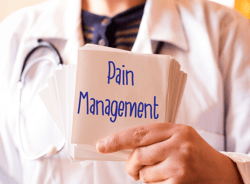Educational Modules
Comprehensive Approaches to Pain Management, Opioid Prescribing, and Substance Use Care
Who Is Eligible to Participate
 These education modules can be completed by the following:
These education modules can be completed by the following:
-
Physicians
-
Physician Assistants
-
Nurse Practitioners
-
Any Healthcare Professional
Session Time: 1 hour (each module)
Continuing Education
Nursing: 1.0 contact hour
Physician: 1 AMA PRA Category 1 Credit(s)™
In support of patient care, these educational activities have been planned and implemented by the CAMC Health Education and Research Institute and Quality Insights. CAMC Health Education and Research Institute is jointly accredited by the Accreditation Council for Continuing Medical Education (ACCME), the Accreditation Council for Pharmacy Education (ACPE), and the American Nurses Credentialing Center (ANCC), to provide continuing education for the healthcare team.
All modules can be applied toward the Consolidated Appropriations Act of 2023 licensure requirement. Modules 1, 2, 3, 4, 5, and 7 can be applied toward the PA Act 124 of 2016 licensure requirement.
Education Modules
Module 1: Pain Management Guidelines
Learning Objectives
- Describe the aims of the CDC clinical practice guideline.
- Describe the rationale for revising the 2016 guideline.
- Describe the 2022 guideline and identify the focus on patient-centered care.

Module 2: Pain Management Assessment and Informed Clinical Decision-Making for Opioid and Nonopioid Medications
Learning Objectives
- Develop a collaborative, stepped-care approach to pain management informed by the biopsychosocial model of pain.
- List the steps in the patient assessment process when determining treatment options, including whether to initiate opioids for pain.
- Identify nonopioid medications for pain management.
- Describe noninvasive nonpharmacologic approaches to pain management.
- Explain how to use the Pennsylvania Prescription Drug Monitoring Program (PDMP) system and describe how it informs clinical decision-making.
- Identify trends in the dispensation of controlled substances in Pennsylvania.

Module 3: Opioid Treatment for Pain Management
Learning Objectives
- Identify factors in determining whether to initiate opioids for pain, including risks and benefits.
- Describe key considerations for opioid selection and dosage determination.
- Explain when to prescribe immediate-release (IR) vs. extended-release/long-acting (ER/LA) opioids for acute, subacute, and chronic pain.
- Develop long-term opioid tapering protocols collaboratively, avoiding abrupt or rapid tapering.

Module 4: Identifying and Addressing Substance Use Impacts with SBIRT
Learning Objectives
- Describe how substance use screenings can assess risk.
- Diagnose patients for opioid and stimulant use disorder.
- Conduct a patient brief intervention using the FRAMES model.
- Develop strategies to support patients with substance use.
- Identify treatment options and refer patients to appropriate substance use disorder (SUD) care.
- Describe SUD treatment, referral, and clinician mentorship and training resources.

Module 5: Strategies to Enhance Patient-Clinician Communication for Pain Management Care
Learning Objectives
- Identify the impacts of empathetic, respectful patient-clinician communication on patient outcomes.
- List common challenges faced by patients with chronic pain that benefit from improved communication.
- Describe motivational interviewing (MI) and explain how the MI framework can support patient-centered care in the context of pain management and substance use disorder (SUD) treatment.
- Define shared decision-making and list techniques for implementing it into practice.
- Explain the process of incorporating patient values, goals, and needs into pain management plans.
- List strategies to support patients and address treatment challenges.

Module 6: Pennsylvania Overdose Trends and Harm Reduction
Learning Objectives
- Describe trends in Pennsylvania opioid overdose surveillance, mortality, and morbidity data.
- Define harm reduction and explain the value of the harm reduction approach with substance use.
- Identify strategies for implementing harm reduction into clinical practice.
- Describe strategies to increase access to naloxone and other harm-reduction services.

Module 7: Health Equity in Pain Management and Substance Use Disorder Care
Learning Objectives
- Increase awareness of racial and gender literacy in pain management.
- Identify health disparities along the pain management and substance use disorder (SUD) continuum of care.
- Describe clinical communication approaches that support equitable health outcomes.
- Use medical documentation to improve social determinants of health that make treatment more accessible and effective.

Don't Miss Out
To schedule your free session, please email Quality Insights or register online for an upcoming live, virtual event.




